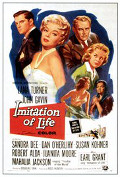
Directed by
Douglas Sirk
127 minutes
Rated PG
Reviewed by
Bernard Hemingway


Imitation Of Life (1959)
As he did with John M Stahl's 1935 film Magnificent Obsession, Douglas Sirk here updates Stahl’s 1934 hankie-soaker, Imitation Of Life. In what was the director’s swansong Lana Turner takes over the original Claudette Colbert pancake queen role, now re-imagined as Lora Meredith, a successful theatre actress in the days when that was a big deal. The film’s agenda is the same – to produce an unabashed tear-jerking melodrama but this time the struggles of a woman and single-mother to follow her star in a male-ruled society, a theme Sirk had explored in All I Desire is integrated with the issue of America’s troubled segregationism that we now know was only a few years away from exploding, The elevation of the subject matter above the relative triviality of Sirk’s classic suburban melodramas into the realm of genuine tragedy together with Turner’s star-power and superb production values from Universal Studios gives us what is Sirk’s masterpiece and a gilt-edged classic of the “weepie” genre.
Substantially similar in plot to the original film, the three main characters are the two struggling single mothers – Turner’s aspiring actress and Juanita Moore’s Annie, a poor black woman, both with a daughter, Annie’s being so light-skinned as to pass for white. Although the Steve Archer character has, wisely, been changed from a suave ichthyologist to a commercial photographer with artistic aspirations, he remains a secondary character, a marker of the staid domestic existence which Lora rejects.
Sirk’s film, the last he made before returning to his native Germany, is certainly more fluid than the original and thanks to Russell Metty’s colour cinematography and producer Ross Hunter's regular team of craftsmen and women, \across the board the film (including opening titles by Saul and Elaine Bass) is visually gorgeous. Although gone with the original is the “Uncle Tom” image of Aunt Delilah’s Pancake Company, Annie still remains the maddeningly obtuse character, her God-sanctioned fatalism if anything, even stronger as she remains by her own choosing the servant, not far removed from the days of the plantation. In this respect the film is less confrontational than the 1934 version in which the Moore character had a greater degree of autonomy.
Moore and Susan Kohner were nominated for Academy Awards for their in portraying the troubled mother-daughter relationship and both are excellent. Turner is also strong but as she was returning to the screen after the 1958 scandal in which her lover gangster Johnny Stompanato, was murdered by her 12 year old daughter, probably a little too hot for the Academy to handle, not that she probably cared overmuch as she had waived her standard fee and took an share in the profits, which as it turned out were considerable, the film becoming Universal's highest grosser of all time and Turner's biggest film (and as her share was 50% she was set for life). Sandra Dee on the other hand is arguably an over-chirpy presence with her childish ways and her infatuation with John Gavin’s Archer is not as well dealt with as in the original whilst the transposition of the main character from a successful business woman to successful actress perhaps weakens our sympathies with the character somewhat as much as it gives Sirk and team the opportunity to max out the glamour factor.
FYI: At Annie's funeral gospel matriarch Mahalia Jackson sings a powerful version of "Trouble of the World".
Want something different?





